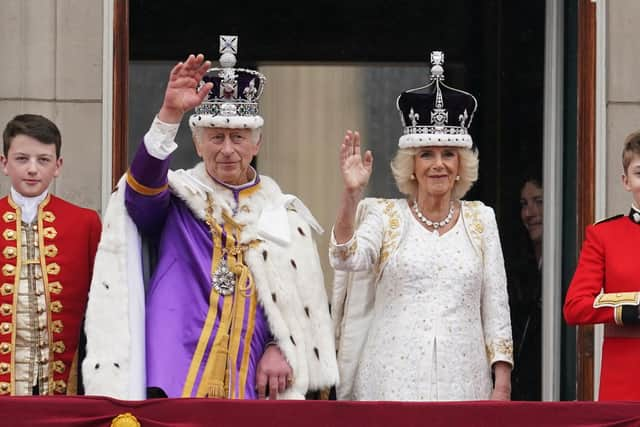King Charles' Coronation 2023: Support for the Royals is falling, but the monarchy won't be abolished any time soon – Ian Swanson
and live on Freeview channel 276
Thousands of street parties were held across the UK at the weekend to celebrate Charles III’s coronation. In Edinburgh, the council had just 12 applications for road closures so neighbours could get together to mark the occasion. Seven out of ten people in Scotland told pollsters ahead of the event that they did not care about the coronation.
The gold carriages, marching soldiers, military bands and solemn ceremonial certainly made an impressive spectacle. It was something most people had never seen before – the last coronation happened 70 years ago. And so much of the arcane ritual – presenting the new King with a sword, then taking it away again; the robing and disrobing; the anointing behind the screen – and the heavy religious character of the event came as a surprise to many.
Advertisement
Hide AdAdvertisement
Hide AdIn 1953, the late Queen’s coronation was watched around the country on newly bought televisions with tiny screens and the neighbours invited round to see it too. But no close-ups were allowed and we’ve only seen short excerpts. So seeing the service in full, with cameras close up, following every move, was a new experience for almost all those watching.


The late Queen dedicated herself to upholding the institution of the monarchy, often putting its preservation before her own or her family's preferences. But her death as Britain's longest-reigning monarch brought inevitable questions about its future. Despite all the history, tradition and tourist interest, a hereditary head of state does not really fit with a modern democratic society. And the wealth and privilege associated with the Royal Family clash with most people’s values.
Recent polls have shown support for the monarchy at a historic low – and not just in Scotland. Just 29 per cent said the monarch was very important, while 45 per cent said either it should be abolished or was not important. More than a third said their view of the Royal Family was more negative than it had been ten years ago. And younger people were less supportive of the monarchy – while 74 per cent of over-65s wanted it to continue, 34 per cent of 18-24 year-olds preferred a republic.
New First Minister Humza Yousaf, like many Scottish Nationalists, is a republican but sensibly said he was attending the coronation because it was his job to represent the whole of Scotland. The SNP’s line on the monarchy at the 2014 referendum was that the Queen would continue as “Queen of Scots” in an independent Scotland, though there has always been the argument that after independence Scotland could decide otherwise if it chose.
Advertisement
Hide AdAdvertisement
Hide AdFormer First Minister Alex Salmond, now leader of the Alba party, was a strong supporter of the Queen while he was in office, but now wants a rethink on the monarchy and argues Ireland, with an elected head of state, offers a good example to follow.
The trend of opinion suggests majority support for a republic is likely to be achieved in Scotland earlier than in the rest of the UK, but without independence that would become just another frustration. And despite the falling popularity of the monarchy across the UK, there’s no republican majority there yet. For the moment, a referendum on ending the monarchy is even less likely than a second independence referendum.
Comment Guidelines
National World encourages reader discussion on our stories. User feedback, insights and back-and-forth exchanges add a rich layer of context to reporting. Please review our Community Guidelines before commenting.